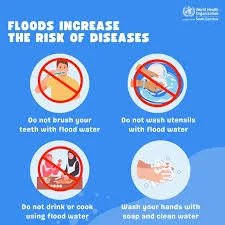Srinagar, Sep 7 – With flooding and stagnant, contaminated water plaguing several regions of Jammu and Kashmir, health authorities are urging residents to adopt strict hygiene practices, secure safe drinking water, and remain vigilant against a surge in waterborne illnesses.
Critical Care Expert, Dr Masood Rashid, of the J&K Health Department, emphasised the health dangers:
“Avoid contact with floodwater, it may contain sewage, harmful chemicals, and sharp debris. Always drink boiled or chlorinated water, wash hands frequently, and discard any food exposed to flood conditions.”
In case of fever, diarrhea, skin infections or injuries, Dr. Rashid stressed the importance of seeking early medical attention at nearest health centre. He reminded parents to continue routine immunizations of children as per schedule at nearest public health facilities.
He said patients undergoing treatment for chronic conditions such as diabetes, hypertension, or other long-term illnesses should ensure uninterrupted use of prescribed medicines and maintain regular follow-ups with healthcare providers.
In response, the Directorate of Health Services, Jammu (DHSJ) has initiated an aggressive 15-day campaign, launched on September 4, to monitor, prevent, and raise awareness about waterborne diseases. Activities include intensive water‐quality testing, public advisories, and community engagement activities led by health workers, ASHAs, and local officials.
A coordinated directive has been issued by the Health and Medical Education Department, partnering with the Jal Shakti Department to ensure contamination is swiftly addressed, and safe water is accessible to all. Community outreach includes distribution of chlorine tablets and the promotion of alternate potable sources where water supply schemes are compromised.
Health experts said key waterborne illnesses include cholera, typhoid, diarrhea, dysentery, and hepatitis A, spread through contaminated water and poor sanitation. DHSJ advises boiling drinking water, practicing good hygiene, and ensuring proper sanitation to prevent outbreaks
In Kishtwar, medical camps and awareness programmes are being conducted daily. As reported by BMO Dr Anil Sharma, these services, including door-to-door treatment, are closely monitored by higher-level officials to ensure effective delivery of healthcare in the most vulnerable zones.
The medical camps are being organized at UT level in flood-affected areas. Medicines and treatment are provided free of cost at the doorsteps of people to ensure timely healthcare services.
To prevent the spread of waterborne diseases due to possible contamination of drinking water during the recent floods, the General Administration Department has ordered a sustained and organized preventive campaign.
The government has directed that field-level staff in collaboration with ASHA shall make the inhabitants of affected areas aware about the disruptions caused to Water Supply Schemes and suggest alternate sources of potable drinking water.
“Chlorine tablets shall be provided and people shall be made aware of other methods of water purification,” said an official.
Officials said that intensive water testing would be carried out by sub-divisional and district labs in the affected areas from where the inhabitants are acquiring drinking water, with a minimum frequency of every 3 days till the regular supplies are restored.
“Testing of water samples of restored water supply schemes shall be carried out before and after the filtration process and also at the household level to ensure safety of drinking water,” they said.
To boost public confidence, water testing reports shall be displayed at prominent locations in affected areas, with at least 3–4 samples per village or high-risk zone collected and tested as per the prevailing protocol, they said.
The water samples shall be taken and tested at both inlet (before treatment) and at outlet (after treatment) and then a summary shall be prepared for comparing the pre-treatment and post-treatment test results for better visualization and quality monitoring.






